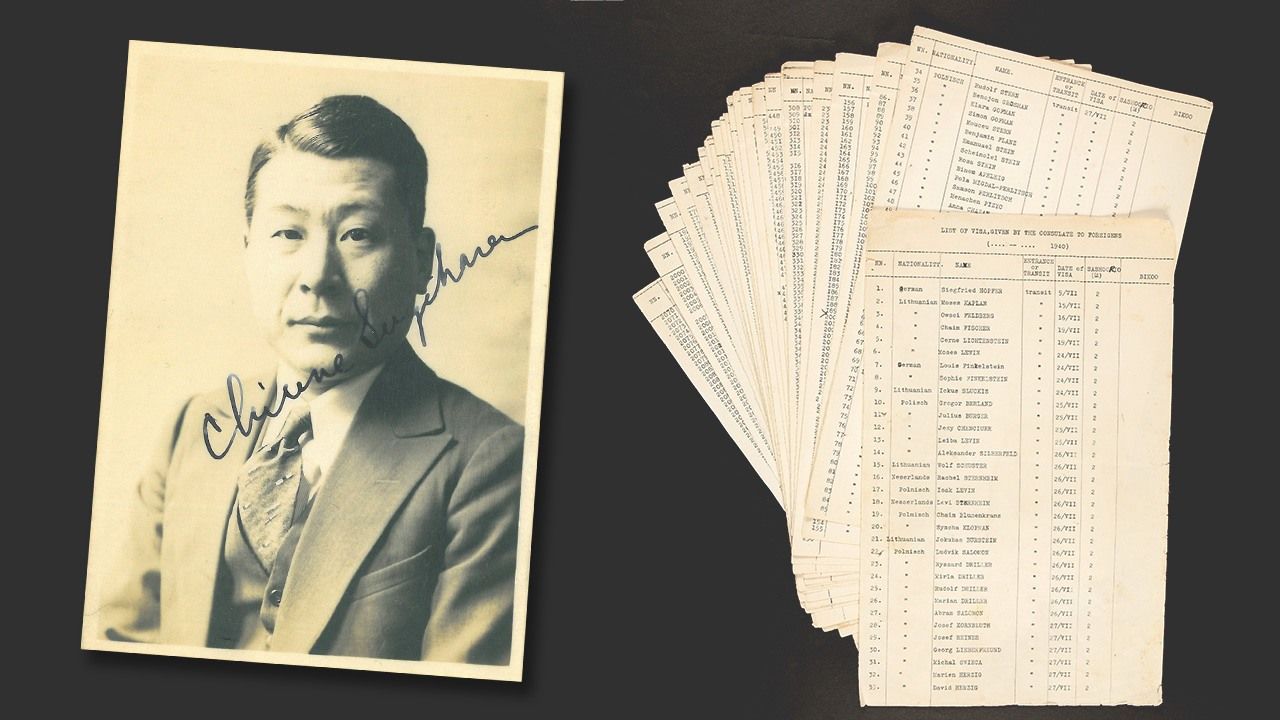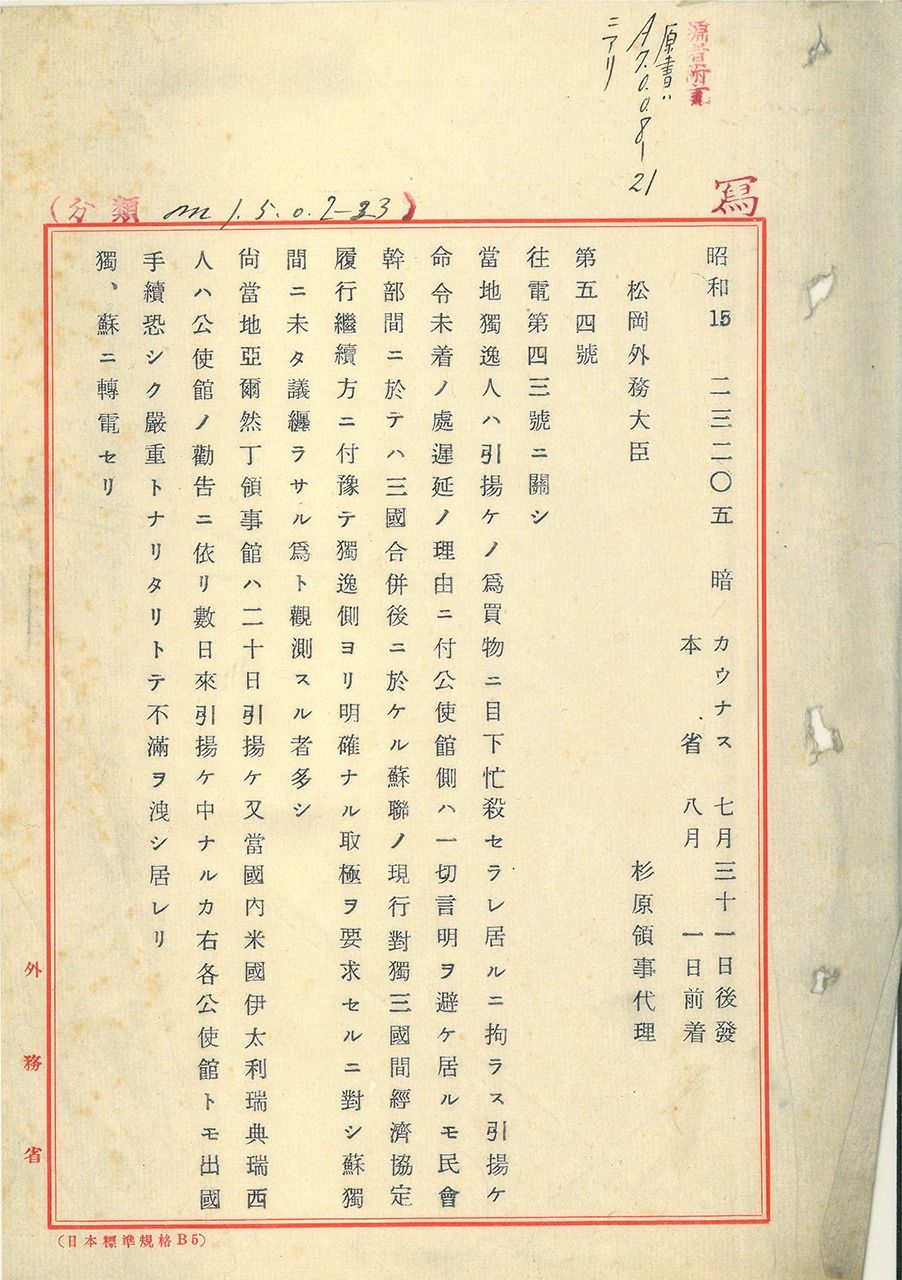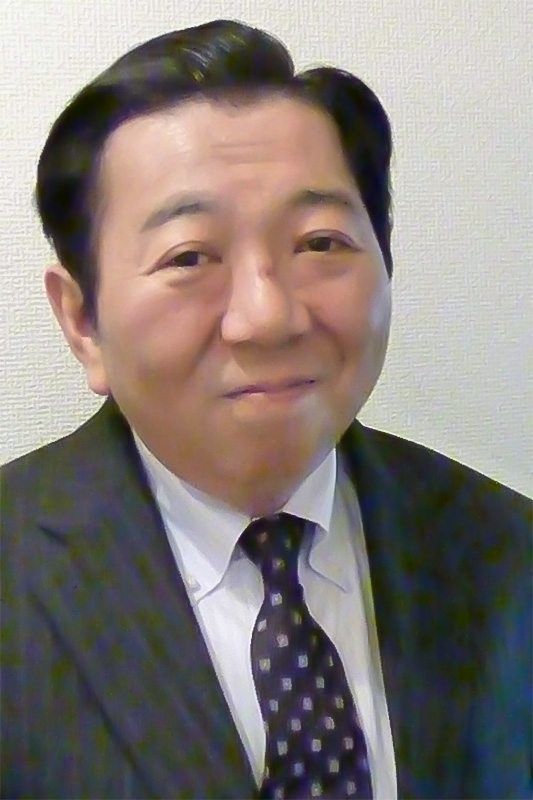
Sugihara Chiune: Toward a Fuller Picture of a Hero
Sugihara Chiune: An Intelligence Officer and a Humanitarian
Politics History- English
- 日本語
- 简体字
- 繁體字
- Français
- Español
- العربية
- Русский
Working on the Brink of War
In August 1939, as the world crept toward all-out war, the Japanese diplomat Sugihara Chiune was ordered to establish a Japanese consulate in Kaunas, the temporary capital of the Baltic state Lithuania. Part of his mission there was to gather and analyze information on the Soviet Union.
Some days before he embarked on this mission, the world was shaken by the news that Adolf Hitler and Joseph Stalin had inked the German-Soviet Nonaggression Pact. Their negotiations also resulted in a secret agreement to divide and occupy Poland, along with other territories in Eastern Europe. By the end of August, full-blown war had erupted. The Soviets took their promised half of Poland and moved to swallow up the three Baltic states of Estonia, Latvia, and Lithuania as well.
In July 1940, Jewish refugees began crowding into the Japanese consulate in Kaunas, seeking visas that would let them flee the country. On July 26, Sugihara decided that he would issue transit visas to as many of them as possible. At this time the Soviet authorities had determined that Lithuania would be absorbed into their empire, and they instructed other nations to close down their diplomatic outposts in Lithuania. Up through early September, when he finally left Kaunas, Sugihara would issue some 6,000 life-saving visas in total, all while remaining in close communication with the Japanese Ministry of Foreign Affairs, which was instructing him to adopt a more cautious stance on their issuance.
Always an Intelligence Officer
During this period, Sugihara is reported to have spent every waking hour—even curtailing his time for meals and rest—to issue visas. But this was not entirely the case, as can be discerned from the cable he sent to Minister for Foreign Affairs Matsuoka Yōsuke on July 31, just six days after he began producing travel permits for the Jewish applicants flooding into the consulate.

The official cable Sugihara sent from Kaunas to Tokyo on July 31, 1940. (Courtesy of MOFA)
The content of the cable was as follows.
The German embassy appears not to have received the order to pull its citizens out of Lithuania, now part of the Soviet Union. The German leaders of private organizations active here indicate that this is because no agreement has been reached between the Germans and Soviets on prospects for the existing economic agreements between Germany and the three Baltic states following their absorption into Soviet territory. Meanwhile, Argentina pulled out its consular staff as early as July 20; the Americans, Italians, Swedes, and Swiss still resident in Lithuania, under instruction from their embassies, have started leaving the country in the last few days, but there are complaints about the arduous emigration procedures in place.
Shiraishi Masaaki has worked for the Diplomatic Archives of Japan’s Foreign Ministry for more than three decades, and is a leading researcher on Sugihara’s career accomplishments. He views this cable as particularly significant.

MOFA historian Shiraishi Masaaki.
According to Shiraishi, this cable—number 54 in the series of official messages telegraphed from Kaunas to Tokyo—is significant for the following reasons. “Sugihara is generally thought to have been entirely occupied with his visa issuance activities during this period, but this cable shows us that he remained active in intelligence collection—his primary duty as a consular officer. It paints a somewhat different picture of Sugihara Chiune than we think of today. He has sent multiple communications to the ministry during this time on the visa situation, but the July 31 cable shows that quite separately from these visa activities, he was also filing reports on the latest conditions in Europe, as gleaned from the evacuation measures being put in place by other countries at the time.”
Shiraishi goes on. “Sugihara had his feelers out among the German consular officers in Lithuania, as well as private German citizens active there at the time. This allowed him to recognize accurately that the German authorities were receiving special treatment from the Soviets in the form of the lack of evacuation orders for their citizens. Germany had long enjoyed strong ties with the Baltic states, and according to the conventional wisdom in Japan at that point, a Soviet takeover of this territory would certainly mean frayed ties between the Soviets and Germans. But the German consular offices were the only ones allowed to remain open, and due to the relaxed attitude the Germans continued to display, Sugihara realized that the USSR-Germany honeymoon was likely to continue, under what ended up being the mutual nonaggression pact. It is clear that Sugihara remained an eminently capable intelligence officer through all of this.”
Keeping an Eye on the Soviet Threat
The standard view of Sugihara’s actions in Lithuania, issuing visas to refugees in opposition to the orders of his own country, is that he was seeking to help the Jewish victims of the Nazi regime in Germany. Shiraishi points out, though, that many of the Jews he helped at this time were members of the population that had suffered from antisemitism in Soviet-controlled territories since the time of the Russian czars. Among the Jews who had fled to Lithuania from Poland following its partition by the Germans and Soviets, the majority hailed from parts of the territory under Soviet control, as has also been made clear by recent historical research in Lithuania.
The Soviet annexation of Lithuania formally took place on August 3, 1940, while Sugihara was still in the midst of his issuance of transit visas. “At that time, Sugihara had more than just Hitler’s atrocities to worry about,” notes Shiraishi. “He was also mindful of the threat of Stalin’s forces. I feel that after witnessing the Soviet cruelty evident in that power’s annexation of the Baltics, he reached his decision to issue visas to Jewish refugees even when they did not meet the conditions set forth by the Japanese government—possessing sufficient travel funds, having secured agreement from a destination country that would allow them to immigrate, and so forth.”
Painting a Fuller Picture of the Hero
It is hard to get a bearing on the true nature of Sugihara Chiune. He remained true to the iron rule of intelligence work—an officer must never speak about his job—and left no memoirs or other writings behind to detail his thoughts or actions.
MOFA historian Shiraishi stresses that the latest document to come to light, depicting his dedication to his intelligence tasks, do nothing to detract from his more celebrated accomplishments. “The Sugihara we see in this cable is not a rejection of the Sugihara we already know about. When we view him as a talented intelligence officer, in addition to being a rare humanist, we get a more vivid picture of him as a man living through tumultuous times.” Indeed, Sugihara’s actions take on deeper significance when viewed in the context of the historical landscape against which they occurred.
(Originally published in Japanese. Shiraishi Masaaki’s statements are his personal views and do not represent the official position of the Japanese Ministry of Foreign Affairs. Banner photo: A signed photograph of a 36-year-old Sugihara Chiune, taken in 1936 and affixed to his application for a diplomatic passport; at right, lists of 2,139 recipients of transit visas issued by Sugihara at the consulate in Kaunas, Lithuania. Courtesy MOFA.)